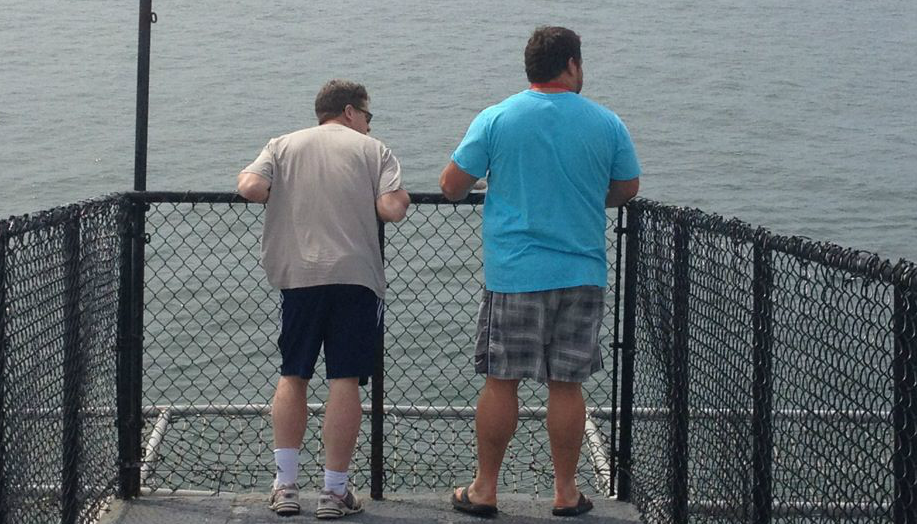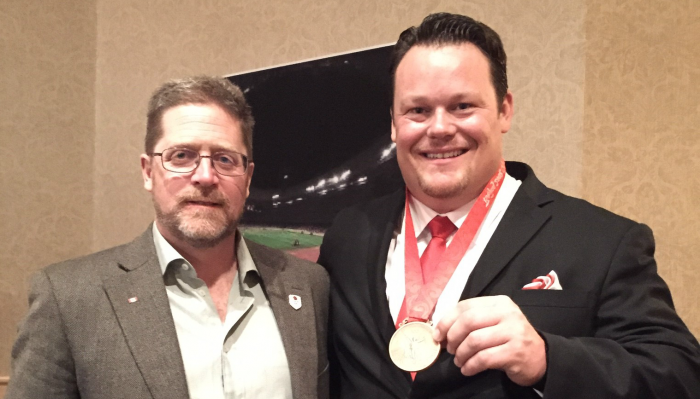Reflecting on Dylan's Road to Olympic Bronze by Coach Derek Evely
This past Sunday, February 15th, Dylan Armstrong of Kamloops, BC was finally awarded the 2008 Beijing Olympic Bronze medal in the Men's Shot Put. The day's festivities included the Bronze Medal award ceremony hosted at the Tournament Capital Centre in Kamloops and MC'd by CBC's Scott Russell, and a dinner to hounour Armstong's long derserved ahcievement. At this dinner, those who've supported Dylan had the opportunity to say a few words. The following speech was given by Dylan's former long time coach Derek Evely, and we feel that it deserves to be shared with all of you.
----
"A great Canadian Poet once said about one of his more famous and successful pieces of work: "that put me in the middle of the road, travelling there soon became a bore so I headed for the ditch.... It was a rougher ride but I met more interesting people there." I think that pretty much sums up Dylan's path to his Olympic bronze medal.
Nothing about it was easy, and nothing about it was mainstream, and nothing about it was normal. But that shouldn't surprise anyone, because being in the middle of the road has never been a place Dylan has found himself in, and for a large part of his career, especially early on, the ditch was the only ride he had.
But what a ride that was.
From the moment I met Dylan I knew he was special: a strange personality mixture of kindness, affability and graciousness. Mixed with just enough mischievousness and treachery to send me off the deep end on a daily basis. Sometimes an hourly basis.
There were days when he was younger when most of the sentences out of my mouth at him began with: “Dylan, what the hell do you think you are you doing?”
And by the way, this was usually followed by “Gary, shut your mouth and stop laughing at Dylan”
But then there were days, a lot of them in fact, where the first words out of my mouth were: “Dylan, you nailed it, well done, I’m proud of you”
I coached Dylan for 11 years, from his start as a young 14 year old thrower to his first breakthrough success as a senior shot putter at 25, when he threw 19.83m in Pomona, California prior to the MT SAC relays (which he won a week later). This was just before Dr. B took over his program. I have fond memories of that trip to California because those two competitions confirmed our belief that he could throw at an international level and do it clean.
We went home and Dr. B took over the reigns and the rest is history.
But the road to get to that point was rocky to say the least. It was filled with highs and lows, wins and losses… many failures and many achievements.
I was hard on him. Really hard on him. Harder than I was on anyone else before or since.
Why? Well, two reasons:
First, keeping this boy in line was anything but easy. It is my belief that in this country when you are a coach and you come across someone that special you simply have an obligation to do whatever it takes to get them where they need to go; you build whatever environment they need around them and in the environment we built that meant keeping him home, keeping him focused and in line and making him believe that the struggle, the daily physical, mental, emotional and at times political struggle, was going to be worth it someday. And it was.
Secondly, he was, at times, his own worst enemy… hyper like a hummingbird… eager like a 20 year old bridegroom. So eager in fact to succeed and so into throwing at times I had to hold him back for his own good.
Often that meant dishing out more than he wanted to take.
But he took it, and he took it often, because, I think, deep down he understood that at that time, the odds were against us but we believed in each other and that was all that mattered.
When one of us crossed the line the other fought back, then there would be apologies and we would move on. It wasn’t always easy but it worked well.
It was a hard, tough environment we trained in, before the days of the current indoor center when we trained in an old World War II ammunition bunker the City loaned to us. Four concrete walls, no heat, no windows, no water, no toilet… and just enough electricity to light a few 40 watt bulbs. It was dark, dusty, infested with mice and freezing cold in the winter. Almost all the equipment we trained with was used, donated or homemade. But it was our home, and it was where many a young athlete learned how to work. I remember throwing in there with Dylan, sometimes just he and I in -10, -15 degree cold, using a small space heater to heat the iron shots between throws.
He didn’t care, he didn’t bitch… he just got on with it; all he wanted was to get better.
I used to love watching Dylan train back then, because as a coach there is nothing better than working with an athlete who is willing to set a standard for all others around him. And set a standard Dylan did.
There was an unwritten rule in that bunker, that you did not piss around during training; once you passed the giant, solid iron door that sealed the bunker you acted and trained like a champion, and a large part of that came from Dylan and the standard he set.
Then in 2005 we hired Dr. B, and I knew almost immediately it was the right fit, because Dylan was ready to move on and mature into the man we see today.
He struggled initially with Dr. B’s new system, perhaps out of devotion to me or perhaps out of sheer Armstrong stubbornness, but eventually he bonded with Dr. B and Dylan’s biggest asset – his loyalty – became transferred a few months later… and at that point everything took off.
Dylan has always believed in the people around him. His greatest strength as an athlete is his devotion and faith in his coach.
The success we are here to celebrate tonight was earned on the back of an entire community of people who had their own belief; a belief that abnormal things can come from seemingly normal places.
I, as a coach, have been fortunate enough to have set foot on a number of warm up tracks at an Olympic and World Championships setting.
Whenever I work with an athlete in such a setting, if the event is big and there is a lot of pressure, I always try to remind them on their way from the warm up track and into the pre-competition call rooms, that while an Olympic stadium can be the busiest, loudest and most exciting experience they will ever have, it can also be the loneliest place in the world when things don’t go as planned.
So I make a point of reminding them that they do not enter that stadium alone... When you walk onto an Olympic track you take every piece of support and belief from every friend and family that has ever known you.
You take in every donation, every free dinner, every pat on the back, every gift of love and goodwill and every struggle and every success you have ever known.
In a sense, you are nothing more than the sum total of not only your own blood, sweat and tears, but also the blood sweat and tears of those who carried you along the way.
You take in your relationship with your coach and your hours with your training partners...
You take in your honor, your pride, your self-respect and most importantly, your faith. Your faith in the work you have done to get you there, your coach, and your own ability to compete.
This is especially true in Dylan's case.
Some medals are won with gimmicks and sport science gadgets, experts who believe they know more than the coach does, bucketloads of money and extravagant facilities.
Others are won with drugs.
But in my opinion, This medal was won with every donated screw, nail, sheet of plywood, strip of conveyor belt, manure bag delivered, piece of equipment welded and volunteer hour logged.
It was won with local business support, PacificSport support and more than anything, City support.
It cannot be overstated the impact, at least in my day, the City, in particular the Parks and Rec department, had on Dylan’s success.
And of course we cannot forget, it was won through the hard work of Dylan and the brilliant guidance of Dr. Bondarchuk.
---
We must never forget that coaches are the glue that hold the sport world together…
While this may sound like a cliché, for a coach there is nothing greater than being witness to the impact sport can have on an athlete’s life. The same is true for any path to growth we choose to put in front of a young person.
This is why coaches become coaches and teachers become teachers.
Indeed when I struggle with life as a coach and I forget why I am doing it, I look back to examples of what the sport has done for those around me and I take comfort in the power of that, and that is enough to get me through the difficult days.
But sometimes, maybe once in a career or once in a generation, some of us, if we are really lucky, we also get to witness the reverse: we get to witness a person impact the sport itself.
This is significant in Dylan's case because he has shown so many of us in the sport two very important things:
First, he has shown us what is possible when someone believes so strongly in, and is so loyal to, their roots. He has shown us what belief in community is…
Every person in this room tonight should feel that they are less than a degree of separation from this medal…
If you ever supported Dylan through the purchase of a bag of manure, put your kid in the track club, supported his coach in any way or simply expressed your faith in him, you contributed.
And while it may have seemed insignificant at the time, it all added up. And you never know… your words or your support may have come at just the right moment to get him through to the next training session.
So I believe that those of us from around Kamloops can look at this medal and say “this is what we did”.
The second thing he has shown us is what can be done when one is committed to being ethical.
Our sport, like many others, struggles with its Dark Side. I don’t share the belief of some of my colleagues that one cannot succeed unless one cheats. I know this to be untrue because I have done it and seen some of my colleagues do it.
And Dylan’s biggest gift to sport in this province and this country is the example he has set for those choosing to compete clean… he has shown us it can be done.
At the highest levels of Olympic sport the most important elements in achieving success are talent, coaching and program support.
But when I think of Dylan, something else comes to mind…
The most important thing in achieving success for an Olympic athlete is the ability to commit to excellence at the expense of your own personal comfort and life ambition.
You must be prepared, at least for a while, to step off the Human Track.
You must be prepared to risk all of the normal conveniences in life in order to pursue your dream… a dream that in all likelihood is going to pay out intangibly.
You must be willing to plow through financial struggle, family misunderstanding, watching your peers move along their own career paths while you live like a pauper, and at times, you must put your career ahead of your personal relationships.
All of these things come in spades for an Olympic athlete trying to compete at the highest levels.
It has been said before that a coach of an Olympic athlete gets to know that athlete better, in a way, than their partners or their families. This is because you see so much more of them and because you see them so often in states most people don’t:
You see them at their true best, and you see them at their very worst.
You see them in their darkest hour and you see them when they are ready to take on the world.
You ride through their journey with them and you watch them grow both as an athlete and as a human being.
In a way, to get his medal 6 years later, surrounded by the people who have always loved and supported him, seems perfectly appropriate to me, and I am thankful the Track Gods made it this way.
It has been one of the great honors of my life to watch Dylan grow and develop into a man of honor and a champion, and I am so proud of him today and to have sailed along part of his journey with him.
God bless the boat that brought us here Dylan…
Thank you,"
Derek Evely









